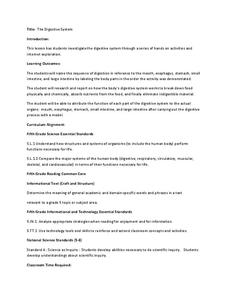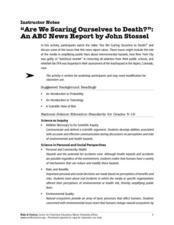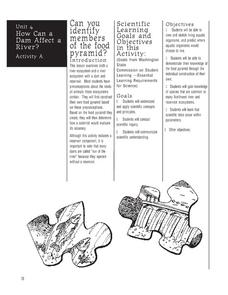Curated OER
When Trees Are Red, Color in Remote Sensing
Student learn about "chromatography" in a hands-on experiment. Students make a chart showing what the colors represent.
Curated OER
What's The Weather?
Students explore the role that remote sensing plays in predicting our weather. Students investigate weather websites, and read about the three kinds of clouds. Students record and draw their observations in science journals.
Curated OER
Trees of Mississippi
Students research tree species found in Mississippi, and record the tree types, numbers of trees, and locations. Students then research the forest industry sites, and determine possible relationships between industry location and tree...
Curated OER
Friction: Friend or Foe?
Using a hands-on approach, learners explore the effect of friction on objects. Learners use toy cars, shoes, wood, metal, and more to experiment with the causes and effects of friction. Afterwards, they conduct experiments in which they...
Curated OER
Nervous System
Get to know the body's central nervous system through an engaging game of nervous system telephone. But this isn't your average game of telephone. Here, pupils must find a way to communicate a message to the brain without speaking....
Curated OER
Muscular and Skeletal Systems
How do muscles move bones? Find out using a built-in-class model. Pupils construct a hand model with paper and string, then follow a series of directions to explore the movement process. Discover additional information about the muscular...
Curated OER
The Digestive System
Discover how the human body's digestive system works with a brain and stomach friendly activity. Scholars taste test a variety of foods to find out how they behave once in the mouth. Class members then play a game called Move That...
Tracy Pendry
Cardiovascular/Circulatory System
Explore the circulatory system with a cardiovascular pump activity that promotes discovery and discussion as class members create a functioning model of the heart. Continue the learning process through a web quest showcasing the...
Curated OER
Collecting Rocks
Students examine how rocks are formed, used, and how to collect them. They listen to and discuss the book, Let's Go Rock Collecting, sort rock samples, and collect rocks from home.
Curated OER
Classifying Shells
Pupils observe and classify different types of shells. They compare and contrast an exhibit they created with one that already exists in a musuem. They discover the different characteristics of shells.
Curated OER
Measure Up!
Discover ways to measure items without standard tools. In this measurements lesson, learners estimate how long certain objects are by measuring with a non-standard measuring tool. Students check their estimates with a ruler and share...
Curated OER
You Are What You Eat: Chemical Residues and Consumers
Students determine how evidence gained from a simulated test for the presence of pesticide residues can be used to determine risk. They use peas to simulate pesticide residue testing.
Curated OER
Ozone Hole Expert Groups
Research topics associated with the hole in the ozone layer over Antarctica. Researchers write five facts about their topic and one question for each of those facts. They present what they learned to the rest of the class. Six topics are...
Curated OER
Minerals - The Building Blocks of Rocks
Students examine how rocks are composed of different minerals. They analyze rock samples, then examine cookies, sorting out the simulated mineral ingredients from the cookies and identifying the mineral ingredients.
Curated OER
Roots: The Ancestry of Modern People
High schoolers investigate the models for the origin of modern humans and the conditions that facilitate speciation and evolution. The classification and nomenclature of hominid species is also examined.
Curated OER
Bacterial Transformation
High schoolers discuss a bacterial experiment they previously performed and complete a pre-assessment. They participate in a lecture discussion given by the teacher through PowerPoint and then complete a cartoon worksheet and...
Curated OER
The Photoelectric Effect
After some online instruction, chemistry aces use their creative abilities to produce a poster describing the photoelectric effect and one type of imaging technology that uses electromagnetic radiation. This simple, straightforward...
Curated OER
Grass as Biomass
Students explore energy properties by listening to a sustainability lecture in class. In this biomass lesson plan, students identify what biomass is, how it can be transformed into a usable energy and how it complements the energy cycle....
Curated OER
Are We Scaring Ourselves to Death?
Interesting! Have your high schoolers watch this 13-minute clip from the documentay, "Are We Scaring Ourselves to Death?" It examines the fear we have as a culture about death and whether or not the media increases those fears. The focus...
Curated OER
Wildlife Conservation I
Focusing on the wildlife in their area, learners identify endangered and threatened species and what these animals need to survive. While this lesson plan involves animals in the Long Island area, it could be adapted for use with any area.
Curated OER
Biology of Bats
Your class will love exploring animal conservation through this lesson on bats. Learners discuss the importance of bats in the ecosystem and talk about the different types and their characteristics. As a follow up, a model of a bat or a...
Curated OER
Wildlife Conservation III
Discuss the importance of wildlife conservation. Learners talk about the animals and plants on the US Fish and Wildlife Services list of endangered and threatened species. Then, they engage in a detailed discussion of the reasons these...
Curated OER
Where is Away?
Focusing on where are garbage goes once we dispose of it, learners explore environmental concerns. Using a clear format, this lesson leads learners through a discussion of waste reduction, recycling, and composting. Then, they discuss...
Foundation for Water & Energy Education
How Can a Dam Affect a River? Activity A
Written for Washington state students in life science, this lesson provides an opportunity to examine the residents of local freshwater habitats. You or the class collects a water sample, and learners try to examine what organisms live...
Other popular searches
- Scientific Inquiry Lesson
- Scientific Inquiry Skills
- Scientific Inquiry Method
- Scientific Inquiry Health
- Scientific Inquiry Model
- Scientific Inquiry Process
- Scientific Inquiry Lab
- Scientific Inquiry Music
- Scientific Inquiry Questions
- Scientific Inquiry + Health
- Scientific Inquiry Experiments
- Scientific Inquiry and Design























